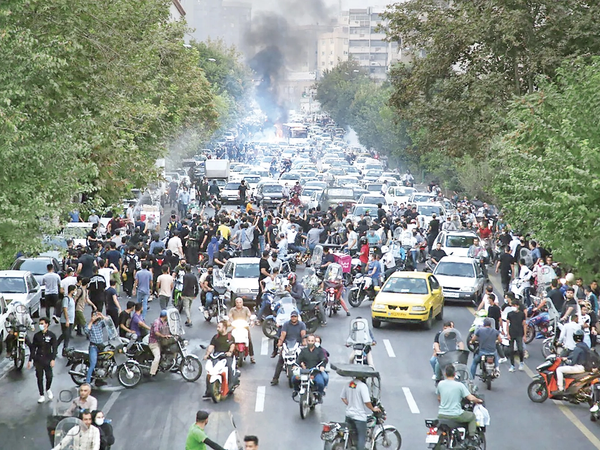The UN Human Rights Council Tuesday adopted a resolution sharply criticizing the situation in Iran in the wake of a deadly crackdown on antigovernment protests.
The HRC voted to accept the Report on the human rights situation Iran from its Special Rapporteur Javaid Rehman and extended Rehman’s reporting mandate by another twelve months.
Rehman was pleased with the result of Tuesday’s vote in the Council. Talking to Iran International after the vote, Rehman said he welcomed the strong vote accepting his Report’s findings and recommendations and extending his mandate.
Rehman said that the vote, stronger this year than in some previous years, showed that the Council recognized that what he called the “alarming and concerning” human rights situation in Iran had become much worse since the death of Mahsa Gina Amini than in the previous reporting period.
The Islamic Republic has been criticized by the UN rights body and international organizations defending human rights for decades. In the latest round of protests, security forces killed more than 500 civilians and arrested at least 20,000 based on estimates presented in detail by monitoring groups.
The Resolution’s summarized Rehman’s original report and its recommendations. These deplored the “widespread, repeated and persistent” violation of human rights in the Islamic Republic and called on Iran to end its “systematic impunity” and hold human rights violators accountable in line with international law.
The Resolution also called for Iran to stop discrimination and violence based on gender and ethnicity and belief. The Resolution expressed its “deep concerns” at the surge of executions and called on Iran to honor its own agreed legal obligations under international law and to halt all executions for offences “that do not meet the threshold of the most serious crimes or for alleged offences committed before the age of 18 years.”
Twenty-three countries, mostly in Europe, voted in favor of the Resolution; eight against, among which were China, Pakistan and Cuba. China justified its No vote on the grounds that it was always opposed to any interference in the internal affairs of states. Pakistan said the Resolution was politically driven and human rights investigations were “best done with the consent of their country concerned”.
This last point would make the Special Rapporteurs job redundant, since Iran has refused both to recognize or acknowledge the mandate given by the UN to the HRC’s Special Rapporteur. Eritrea, Kazakhstan , Vietnam, Bolivia and Bangladesh made up the refuseniks.
India and Qatar were among the 16 abstaining voters, which could both sit on their hands and yet let the Resolution pass. The abstainers included a bloc of sub-Saharan African states. Of these, South Africa said it recognized the part played by women in its own struggles for freedom and encouraged Iran to enhance its cooperation with the UN High Commission for Human Rights. But despite its concerns with what it called the ‘geo-politics’ of the Resolution, South Africa nevertheless did nothing to block the Resolution. Nor did India, which last time voted against the Special Rapporteur’s mandate being extended.
The Resolution, as with previous such resolutions, again “regretted” the refusal of Iran to allow Rehman into the country and called on Iran to cooperate with the Special Rapporteur and provide all information necessary “to allow the fulfilment of his mandate” … This last is what the UN calls its “standing invitation” to Iran to cooperate.
Iran’s UN ambassador Ali Bahreini was having none of it. Speaking in English shortly before today’s vote, Bahreini called the Resolution a “malign attempt” to “name and shame” the Islamic Republic. Bahreini said that the “weaponization of human rights as a foreign policy tool” was unacceptable and “endangers the common cause on human rights”.
The purpose of the Resolution, Bahreini claimed, was to “divert attentions from the violations of the rights of Iranians and crimes against humanity committed by the sponsors of this resolution through imposing nationwide unilateral coercive measures against Iran.”
This referred to sanctions imposed on Iran, a point raised in Rehman’s report which recognized the effects of sanctions on Iran’s health sector and called for exemptions in some areas. But, as Rehman argued in the Council, sanctions “should not be used to excuse violations of human rights”.
Iran has claimed that US economic sanction impede healthcare for its citizens, but in fact medicine is exempt and Iran has been importing annually around $3 billion dollars of medications and claims it is an exporter.
The Resolution voted through the funds for the Special Rapporteur’s mandate for a further year: at just under $500,000 for a twelve-month period covering all expenses, the post is not extravagant. Rehman now has to prepare a new Report by end of summer to be presented at the forthcoming UNGA in October.
The Resolution also calls for Rehman to work with the international independent fact-finding mission (FFM) on Iran, which itself is likely to prove another unwelcome pressure point on Tehran as it prepares its own report on alleged human rights violations there since the death of Gina Mahsa Amini on September 16, 2022. The FFM is due to present an oral update on its work to the Human Rights Council in June this year ahead of its comprehensive report to the HRC in March 2024.
